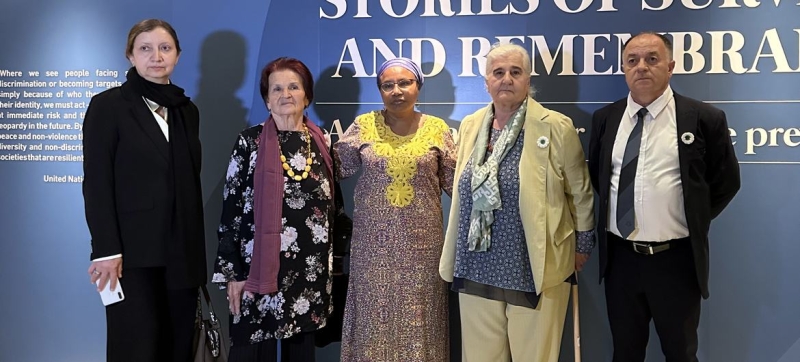
A group of representatives of the Mothers of Srebrenica organization and the Special Adviser on the Prevention of Genocide, Alice Wairimu Nderitu. The UN Chief Human Rights Defender and the UN Special Adviser on the Prevention of Genocide welcomed the adoption of the GA resolution on Srebrenica International Law
UN High Commissioner for Human Rights Volker Türk and UN Deputy Secretary-General, Special Adviser on the Prevention of Genocide Alice Wairimu Nderitu welcomed the adoption by the General Assembly of a resolution commemorating the genocide in Srebrenica in 1995.
“I welcome the resolution adopted today by the UN General Assembly declaring July 11 as the International Day of Remembrance for the Victims of the 1995 Srebrenica Genocide,” Türk said in a statement. This resolution, he said, is further evidence of tribute to all victims and support of their desire for justice, truth and guarantees that similar crimes will not be repeated. The High Commissioner believes that the resolution will contribute to peace in Bosnia and Herzegovina and throughout the region.
He noted that The resolution is particularly important at a time when the voices of those who deny the genocide in Srebrenica are growing louder, and senior political leaders in Bosnia and Herzegovina, as well as in neighboring countries, are making “hate speech”. “The events of recent weeks have reminded us of how important it is to deal with the past in Bosnia and Herzegovina and the Western Balkans,” added the UN High Commissioner for Human Rights.
The new International Day agreed upon today joins the previous actions of the General Assembly to establish an International Day of Reflection on the Genocide of the Tutsi in Rwanda in 1994. United Nations courts have found that genocide was committed in and around Srebrenica in July 1995 and in Rwanda in 1994, Turk recalled.
“I strongly oppose the denial of the genocide committed in July 1995 in Srebrenica, the war crimes and crimes against humanity committed in the territory of Bosnia and Herzegovina during the 1992-1995 conflict, as well as other attempts to rewrite the history of these events, painstakingly documented in the trial. I also strongly oppose the glorification of war criminals and all forms of hate speech and discrimination,” the High Commissioner emphasized.
Stop Genocide Denial& nbsp;
Special Adviser on the Prevention of Genocide Alice Wairimu Nderitu called the adoption by the General Assembly of the resolution on the International Day of Remembrance of the Srebrenica Genocide “an important milestone” in efforts to preserve the memory of the victims of these crimes. She also recalled that all the facts were finally proven by the International Criminal Tribunal for the Former Yugoslavia and recognized as genocide. “Those who attempt to deny, normalize or encourage revisionism regarding this and other crimes committed during the conflict and tried by competent courts are detrimental not only to the victims of these crimes, but also to the overall efforts to establish peace and reconciliation in Bosnia and Herzegovina and in the region as a whole,” Nderitu emphasized.
According to her, questioning the tragic reality of what happened in Srebrenica is unacceptable. Even more brutal is the proliferation of messages that deny genocide – the deliberate killing of Bosnian Muslim men and boys because of who they were, including using hate speech and glorifying war criminals. “Genocide denial must be addressed as a priority,” the Special Adviser stressed.
“Mothers of Srebrenica”
Special Adviser Nderitu commended the tireless work and heroism of the mothers of Srebrenica as they continue to demand justice for their affected loved ones. “It was the refusal of the Srebrenica mothers to accept silence as an answer to questions about the fate of their family members that contributed to the discovery of the first mass graves in 1996. It was their efforts to document the tragic events of the past and testify in court that ultimately led to the key verdicts of the International Tribunal,” says the Special Adviser. According to her, the efforts of activists contributed to the adoption of an international resolution in memory of the genocide in Srebrenica.
The Association “Movement of the Mothers of Srebrenica and the Enclave of Zepa” was founded in 2002 and united thousands of people – mothers, sisters and wives who had lost loved ones. For more than twenty years, the organization has been searching for missing people, mass graves, trying to identify every victim and dead, supporting survivors, seeking justice.
